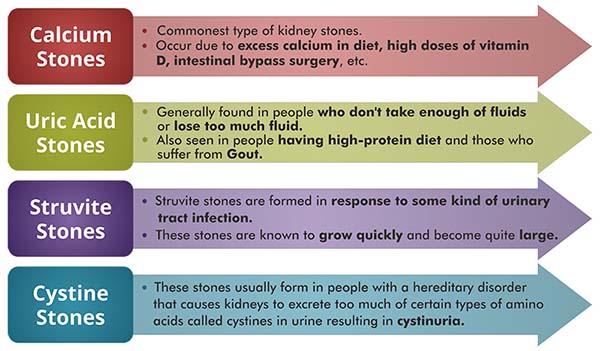
Stones in the kidney which are very small in size (less than 3 mm) do not cause any symptoms.
Symptoms of Kidney Stones start developing when they increase in size and start travelling downwards in the urinary tract causing varying degrees of obstruction when they become located in the ureters, bladder and junctions between the two.
The main symptoms of Kidney stones are as follows:
-
Pain: Pain is one of the most important symptoms of Kidney stones. Location, type and characteristics of the pain are very helpful in diagnosis. Pain may be manifested as follows:
- Severe pain occurring suddenly.
- Pain lasts from few minutes to few hours and is followed by relief for long periods of time.
- Pain is felt in belly region or sides of abdomen, either in the front or back.
- Pain typically starts in lower abdomen and progresses to groin region, called "loin to groin pain".
- Pain may be experienced before, during or after urination and is very excruciating.
-
Other symptoms of Kidney stones:
- Nausea and vomiting
- Frequent urge to urinate
- Burning urination
- Cloudy foul-smelling urine
- Fever with chills
- Presence of pus and/or blood in urine
- Abdominal bloating
- Loss of appetite and weight
- Symptoms of Kidney stones can occur in varying degrees in different individuals. Hence every patient shows an individualistic disease picture.
- Medicines thus prescribed should be unique and individualistic too and Homeopathy becomes the obvious choice of treatment.
Types of Kidney Stones
Knowing the type of kidney stone helps in finding the cause which further aids in knowing how to proceed with treatment and reduce risk of reoccurrence.
















